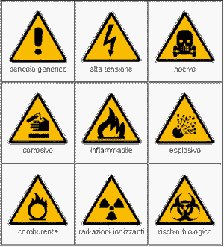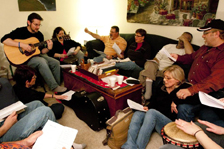Home
The second Reformation
 When we speak of the Reformation we all think of Martin Luther, of justification by faith and
When we speak of the Reformation we all think of Martin Luther, of justification by faith and
of the beginning of the Protestant Church. What do we mean by “The Second Reformation”? Luther
began a reformation of belief but not necessarily of structure, ie, of how we do church once we believe.
How we express church ultimately shows what we really believe!
- Special people, at a special time, in a special place doing special things for me while I watch.
The Importance of the Simplicity of Hearing from God

A question that if often asked is, “how can house churches be simple?” How can they become “simple churches”? What are the simple patterns that are important?
Some years ago, the Lord linked for me this idea of simplicity with Mt. 18:20. “For where two or three come together in my name, there am I with them.” The Lord seemed to say, “What would you do if I physically showed up at your house church meeting?” My response was, “Well, I would immediately turn the meeting over to you!” And, He said, “Exactly.”
Meeting the Needs of Children in House Churches
Editors Note:
.jpg) The simple (or organic) church movement is made of all kinds of people from all kinds of denominations and backgrounds. We have tried to primarily present articles that are written from a positive viewpoint. Some writers(and also bloggers, and other participants of our site), however, present their ideas in a strong contrast to more traditional views of church. We do not want to offend our readers. It would, however, not be appropriate for us to edit these articles, so instead we present them in their entirety so that each reader can get a full understanding of what different people are saying and decide for himself how these principles and thoughts apply to their own situation.
The simple (or organic) church movement is made of all kinds of people from all kinds of denominations and backgrounds. We have tried to primarily present articles that are written from a positive viewpoint. Some writers(and also bloggers, and other participants of our site), however, present their ideas in a strong contrast to more traditional views of church. We do not want to offend our readers. It would, however, not be appropriate for us to edit these articles, so instead we present them in their entirety so that each reader can get a full understanding of what different people are saying and decide for himself how these principles and thoughts apply to their own situation.
We don’t expect you to agree with every word you read here, and neither do we. However, it is important that we join this global dialogue that is occurring, so that we can discern what God is speaking to us both as individuals and as churches. Read, pray, dialogue, and may God speak to us all about how we can be the disciples and bride He has called us to be
How did the early church teach their children? Did it involve Sunday school, children's church, or nurseries?
Letter to Nickolay # 18
 Dear Nickolai,
Dear Nickolai,
Throughout my time as a missionary, I have often been asked, “How is it working? What are the results?” Also, I have highlighted results to show others that we were doing good stuff whether it be church planting, training, Next Generation, Simple Churches, or Drug Rehab Homes. In truth, I have been one who focuses on pragmatism and methodology. When there were results, the world was right side up. When there were disappointments with progress, there was most often a change in methods or a sense of discouragement, sometimes to the point of doubting Christ’s promises to complete His mission.
When you can’t find a church to belong to…

“I live in _________. Do you know any good house churches in my area?”
I often get emails like this, and here’s how I often respond:
“There are various tools that might help you discover a simple/organic church in your area, (I usually point them to the “find a church” feature on www.house2house.com <//www.house2house.com> ) but I’d like you to pray about a different approach. You’ve been a believer for a number of years. Why don’t you start something? Work with those who don’t yet know the Lord or the unchurched—it’s much easier. We’d love to help you.”
Most Christians, especially those from a more traditional form of church background, assume the obvious way to start any kind of church is to invite a few Christians to their home for fellowship. As other believers join them and the group gets large enough, they will multiply out into two churches and so on.
Leverage the Limits of Our Relationships
 Have you ever heard of Dunbar’s Number? According to Robin Dunbar, there is a maximum number of relationships a person can have due to cognitive limitations and social group sizes. According to Dunbar, the average person can have a maximum of 150 meaningful relationships with a broader range of 100-230 relationships. The larger the number, the more restrictive or superficial the relationships become.
Have you ever heard of Dunbar’s Number? According to Robin Dunbar, there is a maximum number of relationships a person can have due to cognitive limitations and social group sizes. According to Dunbar, the average person can have a maximum of 150 meaningful relationships with a broader range of 100-230 relationships. The larger the number, the more restrictive or superficial the relationships become.
I would venture to say that most of us don’t think very strategically about the limitations of our relationships. Of course we have our immediate relations to our family and extended family. Beyond that we have our friends and church family. Once you factor in the “given’s”, the number of available meaningful relationships is relatively small. That means we need to be careful in how we invest our lives cognitively and missionally for the sake of the gospel.
Knowing these limitations, why not come up with a plan on how to leverage your relational margin for the sake of gospel advance? How many relationships could be acquaintances? Neighbors? Friends? You can’t change the world with 500 relationships, but you can change a neighborhood with 10. I fear the problem with most of us is that we have failed to consider these limitations and leverage our relational margin at all for gospel causes. To correct that, we need to begin with examining our relationships and make efforts to demonstrate personal hospitality, receptivity, and availability for God to use us in the lives of others.
Dangerous Sunday- The Program(Part 3)

In the previous posts in this series, I suggested that it is dangerous to the spiritual maturity of believers to place an extraordinary emphasis on Sunday as “The Day” or a specific location as “The Place” for Christians to meet together as the church.
Besides teaching people that they are only the church on a particular day and at a particular place, the practices of modern, traditional churches also dangerously teach people that the church is only meeting when they follow a particular program. Sometimes this is called liturgy. Sometimes it’s a specific set of activities or events that must happen.
Can you imagine what would happen on Sundays among most churches if there were no songs? What if no one preached a sermon or delivered a homily? What if certain creeds or prayers were not recited in unison?
And, yet, none of these things are necessary for the church to meet. However, because most churches practice these things “religiously,” people are taught that they are necessary and if they don’t happen (sometimes in a certain order) then it is not church.
In this case, it is not the day or the place that is defining the church, but a certain set of activities. Interestingly, these activities typically have little to do with the people involved. Anyone could sing the songs or recite the creeds/prayers, and it would still be considered church. The people themselves are replaceable. The people no longer define the church; certain activities – the program – defines the church.
Authentic Change Leading to Restoration

As my mind surveys the stories found in the Bible, I can not help but see that our God is a God who leads us to places requiring significant change and the associated risk. Abraham, leaving his country; Noah, building the ark; Moses, reluctantly accepting the call; Caleb and Joshua, saying we can not but God can; Esther, risking her life and luxury; Jonathan, standing with David against his father and King; Jesus, the ultimate revolutionary; and Paul, into the desert. Our God is a revolutionary and He calls us to join Him as revolutionaries who are willing to seek significant change.
Authentic restoration of the church(es) from their current plight in both America and the Slavic nations will require significant change. No tweaking of existing systems will be sufficient. Our current systems are perfect for the results we are getting: DECLINE.
The changes that I am referring to are not new changes, but a return to the apostolic patterns found in the New Testament and a return to follow the life and words of the Head of the Church – Jesus Christ. There are principles and concepts from the early church, which should lead us into the future. These concepts and principles are the same for all who wish for and work for restoration. They are cross-cultural and apply to both America and Ukraine. They are also counter Christendom. We will not be able to maintain the hallmarks of Christendom. There will need to be some deconstruction to take place before we can see restoration. We need to break our dependence on buildings and professional leadership. We will need to release baptism and the Lord’s Supper to God’s people. We will need to seek release from the institutionalism of the church.
Simple Church Conference 2013, June 7-9, Kiev, Ukraine
 Do you want to be a more passionate disciple of Jesus Christ? Do you desire to multiply your life and make disciples more effectively? Do you long to see churches started that are centered on Jesus Christ, that experience deep loving relationships, and that are able to reach the lost and multiply? If this describes your heart and if you are active in a simple church, then this conference is designed for you.
Do you want to be a more passionate disciple of Jesus Christ? Do you desire to multiply your life and make disciples more effectively? Do you long to see churches started that are centered on Jesus Christ, that experience deep loving relationships, and that are able to reach the lost and multiply? If this describes your heart and if you are active in a simple church, then this conference is designed for you.
Special Guest: Ed Waken from Phoenix, Arizona
Ed is a disciplemaker and church planter who has trained and coached leaders in cities around the world. He is a close personal friend and co-laborer of Neil Cole(author of Organic Church). Ed and Neil regularly conduct training times together. You will discover that Ed is passionate about knowing Christ and about building His kingdom. Ed has done a training time in Kiev in the past, and he is greatly respected and appreciated by all those who have learned from him.
Participants: Teams of people who are involved in multiplying disciples and simple churches
Cost for Food and Lodging: $60. There are limited amount of scholarships for those with financial needs.
For more information or to register for the conference, please write Dima Sezlonov at simplechurch.books@gmail.com
Space is limited, so if you are interested contact us soon.
Extraction Evangelism and Community Evangelism

Changing our evangelistic mindset isn’t easy. Extraction evangelism is ingrained in Western Christian culture. Yet extraction evangelism techniques create too many barriers to the Gospel to result in church planting movements. Period. They may even inoculate people against receiving the Gospel. There is not one single example, to my knowledge, of a group that uses extraction evangelism as their primary strategy ever catalyzing a church planting movement. Community evangelism, on the other hand, is part of catalyzing church planting movements around the world: even as you read this post! If church planting movements are our goal, we have to make the jump from extraction thinking to community thinking.
About the Site

All across the world, people are gathering in small groups to serve and worship God, be family, and encourage and affect each others lives. These gatherings are called by many names including simple church, organic church, and house church. Whatever you call it, the people involved value incarnational ministry to the lost, living radically for Jesus and each other, and are willing to get rid of anything that gets in the way of being fully devoted followers of Christ.
Detailed...
